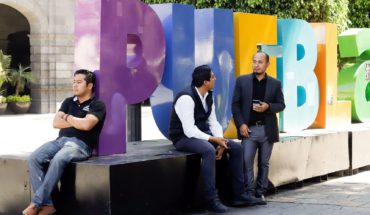the President of Mexico Andres Manuel Lopez Obrador has blamed neo-liberal policy of slow economic growth, the increase of poverty and corruption. He even compared the 3 decades that this economic and social – model has been existing since the mid 1980’s to date – with three centuries of looting of colonial of the Spanish Crown.
On several occasions Lopez Obrador has said that violence and inequality that the country is plundering and abandonment policy product, result of neoliberalism.
During the press conference that offered on January 29 from the National Palace, Lopez Obrador said that “neoliberalism not only caused damage to economically, materially, but it destroyed families”, and that “prisons are full of young people, the majority of the” “to lose their lives are young”, the result of this economic model.
Read: AMLO offers to combat inequality and corruption but not prosecute officials of the past but what is neoliberalism?, really is the cause of the decline of growth in the country and the increase in poverty and corruption?
Political animal consulted with political scientists, sociologists and economists on the topic, who agreed that this economic model, by itself, is not entirely bad nor the only reason why there is corruption in the country. Although they noted that Mexico failed to apply it in their favour and had unfavourable consequences.
What is neoliberalism?
Doctor José Fernández Santillán, a research professor of the Tecnológico de Monterrey, describes to the neoliberal economic model such as the privatization of the industry and opening the market to foreign products. This while the State diminishes its intervention.
“As the former U.S. President Reagan put it, the neoliberal model is one that is designed for those who know how to generate wealth do so, hoping that the benefits go dripping into the classes below”, explains.
According to Dr. Arturo Huerta, academic of the economy Faculty of the National Autonomous University of Mexico, this model is “controlled by big business and the financial sector, which is who regulates the economic activity, so they they are against the involvement and presence of the State (Government) in the economy”.
Therefore designates the academic, “is against the protectionist policies that previously had the Governments, which were those who regulate the movement of goods and did not allow the importation of goods that were produced internally”.
On social matters, explains Gustavo Urbina, of the center of sociological studies of the College of Mexico, neoliberalism allows State “rest part of their pressure” in other issues such as health, education and even social policy.
“Neoliberalism allows other actors besides the State participate in the offer of services, generate competition, allowed under certain regulatory terms that people have greater capacities to choose between different alternatives for consumption “a service or”, points out, but warns that without proper control falls into monopolistic practices that lead to more inequality.
“The rich get richer and poor people still actually be perpetuating in that same condition”, he explains.
Have neo-liberal policies slowed economic growth in Mexico?
The answer is Yes, according to experts consulted. Arturo Huerta explains that while in 1980’s public investment accounted for 13.1% of national activity, currently only 2.5%.
“This drop in investment in the public sector affects economic growth and accelerate the privatization of infrastructure and national strategic sectors,” exhibits.
According to the Economist, “economic policies are not neutral, have been taken to reduce the participation of the State in this economic activity and increased that of the dome business and financial sector, why is the Bank reported annual profits of” up to 25%, as the country grows at a rate of 2% “.”
Has neoliberalism created inequality and corruption in the country?
Doctor José Fernández, corruption “comes before the neoliberalism, what happens is that he now concentrated on the political and financial elite, but this has always existed in Mexico”.
Read: Mexico, in free fall during the six years of Peña Nieto in combat corruption however, political scientist Gibran Ramírez Reyes points out that the current corruption is consequence of neo-liberalism.
Explains that since 1982 and the privatization of State enterprises, a growing number of private actors.
“Growing circle of political entrepreneurs and businessmen involved in policy, which encourages corruption networks of large, not of the corruption of the citizen foot”, as they are in contracts in tender processes.
Meanwhile Abraham Vergara Contreras, Coordinator of the Bachelor’s degree in accounting and business management and a degree in finance from the Universidad Iberoamericana, says that neo-liberalism “is not the devil, nor is the cause of all the ills in the country”.
This economic model, said the academic, it does not encourage corruption, which describes itself as an act that responds “to the decision of the people”. Even, says, “If neoliberalism are well applied, could reduce inequality”.
On this point, Dr. Arturo Huerta differs, because in his opinion, these policies “accentuate income inequality, since they respond to an interest of class that helps the financial sector and precarious situation of workers, with high unemployment rates and” low wages”.
The director of the degree in international business from the Tecnológico de Monterrey, Manuel Valencia, coincides with Huerta, as explains that neo-liberalism ‘does not equal and increases social differences. In Mexico, its implementation did not include policies to reduce poverty or supporting access to education”.
For Urbina, PhD in Social Science, the country’s problems cannot be attributed only to the neo-liberal policies, “because before them we had unique problems of inequality and poverty”.
However, it points out that neo-liberalism has not had a positive impact on the quality of people’s lives.
Can neo-liberal policies bring benefits to the economy?
Manuel Valencia said that “statist” economic policies, regulated by the Government, i.e. generated very bureaucratic models in which proliferated corruption.
Therefore, it points out that the benefits of the neoliberal economic model are that there is less regulation and control by the Government, which is generated a trade liberalization that allows the exchange of more variety of products and the competitiveness of the country in the field Global.
The problem, according to the scholar, is that this model was misapplied in Mexico, but in countries such as Germany, Chile, South Korea and Colombia has benefited the economic growth.
Raymundo Tenorio, academic of the Tecnológico de Monterrey, notes that “Mexico today is moving too slow of a true economic neo-liberalism, but if applied as such we would have a true welfare State”.
Sociologist Gustavo Urbina sees certain changes to the society thanks to the model. One of them is that Mexicans have had a gradual and increasing access to services such as cellular phones and the pay television, thanks to the lowering of the cost of these.
Neoliberalism in times of Lopez Obrador “Lopez Obrador speaks against neo-liberalism, however it is applying a reinforced neoliberalism, in the sense that is desinsitucionalizando to the country with the cuts to the national budget, the mass dismissal of” workers in the Government and decentralization of public offices”, says José Fernández.
According to Fernandez, the President “is weakening the State as an institution, but is strengthening his person”.
Arturo Huerta, for change expected by the population who voted for Lopez Obrador “is it taken”. Example, mentions, they are invitations to entrepreneurs to participate in the projects of public works, such as the Maya train.
According to the Economist Tenorio, neoliberalism Yes gave privileges to the political class, said Lopez Obrador; However, “where mince is to say that this model is the devil, because he will have to live with it wants or does not want to, the current scheme of trade”.
From the perspective of Gibrán Ramírez, who was candidate of Morena to the constituent Assembly of the CDMX, there is an attempt of the Government of Lopez Obrador to give a twist to economic policy, although it is considered that it is “a very complicated bid, there is nothing that cannot be” modify, should be more or less rigid macroeconomic controls. Yes there are some different winks, the clearer is the increase to the minimum wage, which is the most important in the last 30 years”.
Read: Starting in January, the minimum wage will be 102.68 pesos and at the border of 176.72 Urbina says although they will implement a series of social programs, “not only should question what will serve the social policy, but how are going to create “abilities, new skills so that these people have possibility of upward social mobility”.
He adds that give resources scholarships is not clear how improve the quality of life of vulnerable sectors.
“The program of incentives for young unemployed is quite interesting, because it not only provides a grant but that are also based on stimulating that different companies will be required to provide training to young people.”
But he warns that the challenge for the Government will be generate more space in the labour market to absorb this labour force.
Thanks for reading! Help us to continue with our work. How? You can now subscribe to political Animal on Facebook. With your monthly donation, you will receive content special. Find out how to subscribe here. Check our list of frequently asked questions here.
translated from Spanish: What is neoliberalism that criticizes AMLO
February 14, 2019 |





